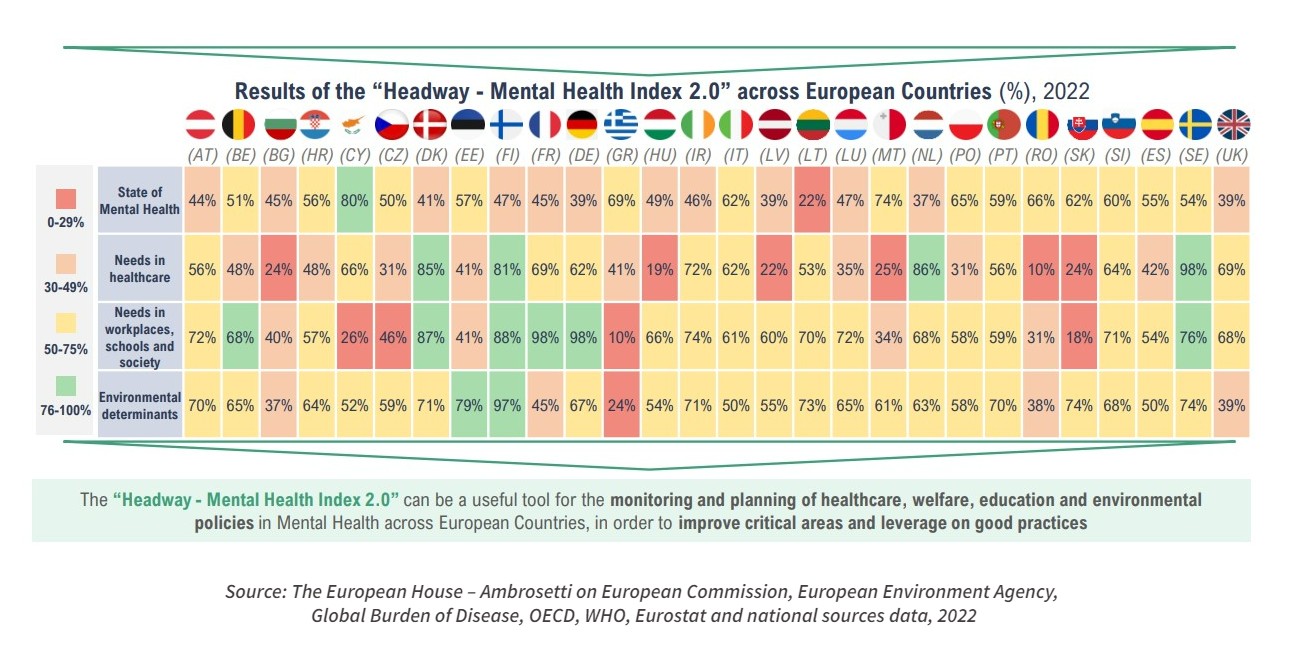10 October 2022


Today, October 10, 2022, is the WHO’s World Mental Health Day.
What is mental health?
“Mental Health is a dynamic state of internal equilibrium which enables individuals to use their abilities in harmony with universal values of society. Basic cognitive and social skills; ability to recognize, express and modulate one's own emotions, as well as empathize with others; flexibility and ability to cope with adverse life events and function in social roles; and harmonious relationship between body and mind represent important components of mental health which contribute, to varying degrees, to the state of internal equilibrium”. Committee on Ethical Issues of the European Psychiatric Association
The topic is now receiving more broadcast and social media attention, particularly following the current events. During 2022, the European population has witnessed the co-occurrence of significantly impacting crisis factors, which included the COVID-19 pandemic, geopolitical factors (starting from the war in Ukraine) generating an unprecedented humanitarian crisis, explosion of socio-economic uncertainties (among others, inflation and the explosion of energy costs) and the disruption of supply chains, adding up to major global challenges, such as the climate crisis, demographic winter and social tensions - which together may lead to a substantial rise in mental disorders.
Several actions, activities, programs and interventions have been enforced by the WHO in order to support Member States in dealing with mental health disorders in the most relevant manner, these include, among others the elaboration of the Mental Health Action Plan (last publication 2013-2020), which has been extended until 2030. Moreover, mental health was included in the Sustainable Development Goals (SDGs).
However, the latest analysis of Countries’ performances carried out through the WHO’s Mental Health Atlas showed that progress has been very slow.
Mental health and the Covid-19 pandemic
The potential mental health effects of the COVID-19 pandemic, the various restrictions and its health and socio-economic consequences, are one of the most important challenges of the pandemic. According to the Global Burden of Disease (GBD), it caused a +27.6% increase in major depressive disorders (MDD), +25.6% increase in anxiety disorder(AD), and young people registered higher risk of suicidal behaviours.
The consequences on mental health of the pandemic affect all ages – from younger generations (disruption of schooling) to adults (unemployment, poverty, debt) and elderly people (isolation) – but particularly concerning are the impacts on children and adolescents, elderly and people with disability, and healthcare professionals.
Available data on gender-specific effects suggests that the mental health consequences seem to disproportionately affect women, who were affected more than men for both major depressive disorders (+29.8% vs. +24.0% in males) and anxiety disorders (+27.9% vs. +21.7% in males), as we detailed in a previous study on women's mental health.
Headway Mental Health Index 2.0
Monitoring the responsiveness of a Country, assessing its trend over time and comparing it to other systems, allows for a dynamic and more complete picture of the effects of health, social, employment, educational and environmental policy interventions on the mental health status of the population.
This is the premise of “Headway”, an initiative on mental health that was conceived and launched in 2017 by The European House - Ambrosetti in partnership with Angelini Pharma, with the aim of creating a multidisciplinary platform for strategic reflection, analysis, dialogue and comparison between various European experiences.
The 3rd edition of the “Headway – A new roadmap in Mental Health” Forum took place on September 28, 2022 at the European Parliament in Brussels. During the event, the report “Headway - Mental Health Index 2.0” was presented.

Pierluigi Antonelli, CEO Angelini Pharma, and Daniela Bianco, Senior Partner and Head of Healthcare Area at The European House - Ambrosetti
The "Headway Mental Health Index 2.0" is designed to provide a multidimensional picture on mental health across European Countries (EU-27 + UK). It is a framework aimed at measuring a limited number of indicators representing key aspects of Mental Health and selected based on the comparability and availability of data from the EU-27 + UK Countries. The "Headway - Mental Health Index 2.0" considers 55 KPIs related to the following macro-areas.
Environmental determinants of mental health
- Climate change may increase impulsive behaviours and lead to higher suicide rates
- Air pollution, such as high levels of PM2.5 (fine particulate matter), contributes to the development of anxiety. 1 out of 8 EU citizens lives in urban areas exposed to high levels of PM2.5
- 20% of EU population lives in areas where traffic noise levels are harmful to mental health
- 1 out of 5 people living in post-conflict settings may develop a Mental disorder
Mental health status of the population
- In Europe, the COVID-19 pandemic triggered a +25% increase in prevalence of anxiety and depressive disorders, affecting more than 110 million people
- Mental disorders are among the 10 most common diseases, and are the 2nd most disabling noncommunicable diseases (NCDs). They are responsible for more than 16.9 million years lost due to a disability (YLDs)
- Approximately 4% of annual deaths (235,000) are caused by mental and behavioural disorders. In the WHO-Europe region, poor mental health is responsible for 140,000 deaths per year by suicide: it is the 4th cause of death in the population below 20 years
- Addictive behaviours, binging and episodes of abuse of alcohol, tobacco and drugs are frequently related and represent major signalling factors of incoming or ongoing Mental Health disorders. In the EU, 32.9% of people report heavy episodic drinking, 25% of men and 16% of women report daily smoking, and 29% have made use of illicit drugs at least once in their lifetime.
Responsiveness of the system to mental health needs in healthcare
- The Netherlands, Belgium, and Portugal have the highest scores in quality of mental healthcare in Europe. The lowest 3 positions feature Romania, Greece, and Latvia
- The average expenditure for mental healthcare is equal to 5.4% of the national GDP. Countries invest differently in mental health. Particularly, France (14.5%), Germany (11.3%) and Sweden (10.0%) are the principal investors, significantly exceeding the EU+UK average. There is however an under-reporting and missing data issue that bias the actual availability of healthcare resources
- The cost related to mental illness is equal to 600 billion euros (4% of European GDP). By 2030, mental disorders will account for more than 50% of the total global economic burden of noncommunicable diseases (NCDs)
Responsiveness of the system to mental health needs in workplaces, schools, and in the society
- Across OECD Countries, the unemployment rate is, on average, 7.7% higher for people reporting a mental health condition. Moreover, the pay gap between individuals with mental illness and the general population is equal to 17.5%
- According to the last WHO data available, among EU27+UK, 45.8% of the Countries have introduced work-related mental health prevention and promotion programmes. In most cases, they are managed directly by the Government, while in other, rarer cases by the private or through a public-private partnership
- The school system represents a major player in the development of good mental health for children and adolescents. Scientific research shows that the onset of mental health conditions such as depression and anxiety are linked with decreased school performance: 14% of school dropouts in Europe are students with mental disorders, 24% of students with mental distress are more likely to repeat a grade
Closing considerations
Within the European continent, a variety of environmental health, social and economic systems co-exist.

One of the most important lessons learned during the making of this study is that, in order to adequately meet societal needs in the sector, mental health services need to be able to quickly adapt to changing circumstances and environments so to maintain their continuity even during a state of emergency. This is only possible through delivering support in community-based settings and across all sectors (including environment, workplaces, schools and society in general).
Despite the advances achieved in some Member States, other are still lagging behind. In this scenario, the updated “Headway – Mental Health Index 2.0” can be a useful tool for the monitoring and planning for healthcare, welfare, education and environmental policies in mental health across European Countries, to improve critical areas and leverage on good practices.
Today, not seizing the moment would become a lost opportunity for decision makers creating a threat to social cohesion, sustainability, and economic growth of the Countrywide System. It is therefore urgent to address mental health through cross-sectorial and integrated policies, as part of a comprehensive EU Mental Health Strategy and a European Year dedicated to Mental Health in 2023.
